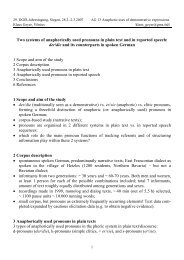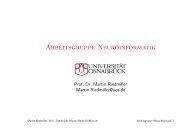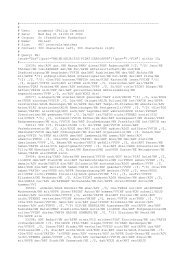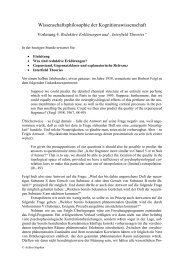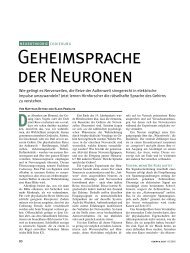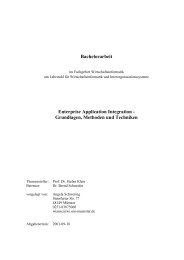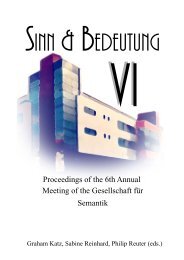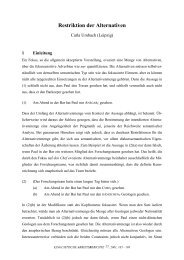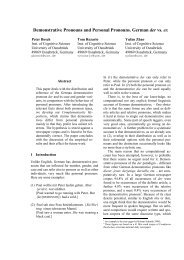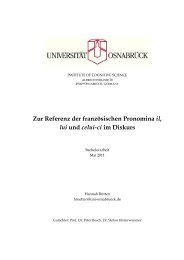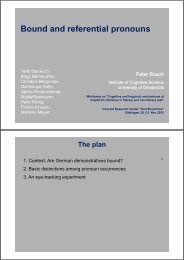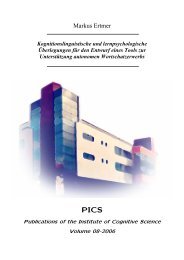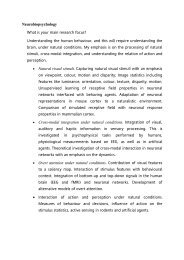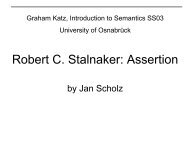Kapitel 2 Der Verein der Freunde und Förderer - Cognitive Science ...
Kapitel 2 Der Verein der Freunde und Förderer - Cognitive Science ...
Kapitel 2 Der Verein der Freunde und Förderer - Cognitive Science ...
Erfolgreiche ePaper selbst erstellen
Machen Sie aus Ihren PDF Publikationen ein blätterbares Flipbook mit unserer einzigartigen Google optimierten e-Paper Software.
1.5 Promotions- <strong>und</strong> Habilitationsvorhaben<br />
Promotionsvorhaben: Roul Sebastian John<br />
Comparative <strong>Cognitive</strong> Robotics: Using Autonomous Agents as Models of Learning<br />
While the development of autonomous agents in behavior-based AI seems to offer a very promising new<br />
approach towards studying intelligence, it is yet far from clear how mobile robots might successfully be used<br />
as models for cognitive science. The main thrust of the new methodology called Comparative <strong>Cognitive</strong><br />
Robotics is to use an autonomous mobile robot as a modelling tool for studying animal learning, which is<br />
then evaluated in controlled experimental environments which are similar to those used in comparative<br />
psychology. An integrative, empirically gro<strong>und</strong>ed model of several phenomena of learning and adaptivity<br />
shall be developed in succeeding steps. In addition, it is planned to investigate the relation of these<br />
phenomena commonly fo<strong>und</strong> in most animal species and the phenomena of unconscious, implicit learning<br />
and adaptation in human subjects.<br />
Promotionsvorhaben (abgeschlossen am 20.07.2001): Kai-Uwe Kühnberger<br />
Formal Frameworks for Circular Phenomena<br />
This dissertation has four parts. The first one is a general introduction into the topic of the work. An<br />
important aspect is the attempt of a conceptual clarification of circularity, in particular in relation to the nonwell-fo<strong>und</strong>edness<br />
of a phenomenon. This clarification represents the philosophical core of the primarily<br />
formal dissertation. In the second part, Kripke's fixed point approach concerning partially defined truth<br />
predicates is examined. The main results of this second part are three characterization theorems of<br />
subclasses of interlaced bilattices and their applications. In the third part, revision theories are introduced.<br />
Their adequacy for the representation of circularity is discussed. Additionally, the complexity of these<br />
theories, the relation of revision theories to a wi<strong>der</strong> thematic context, and their empirical properties are<br />
examined. In the last part, circularity is introduced on the level of set theory. The crucial idea is the concept<br />
of a coalgebraic modeling. In particular, the modeling of truth and the representation of the difference<br />
between private and common knowledge is emphasized. A comparison of the different accounts is provided<br />
in the last chapter.<br />
Betreuer: Prof. Dr. Uwe Mönnich, Universität Tübingen<br />
Promotionsvorhaben (abgeschlossen am 17.12.2001): Martin Müller<br />
Machine Learning for User Modeling<br />
The work focuses on new Machine Learning approaches in the context of user modeling. The application<br />
domain is intelligent information retrieval, in particular a multi-agent system for learning user models in<br />
or<strong>der</strong> to increase precision in a web meta search process. A paradigm of lucid user models is developed and<br />
realized by inducing conceptual user models using symbolic machine learning algorithms which take into<br />
account an ontology of document content descriptions as backgro<strong>und</strong> knowledge. Das Promotionsverfahren<br />
wurde am 11.07.2001 eröffnet.<br />
Betreuer: Prof. Dr.-Ing. C. R. Rollinger<br />
34



